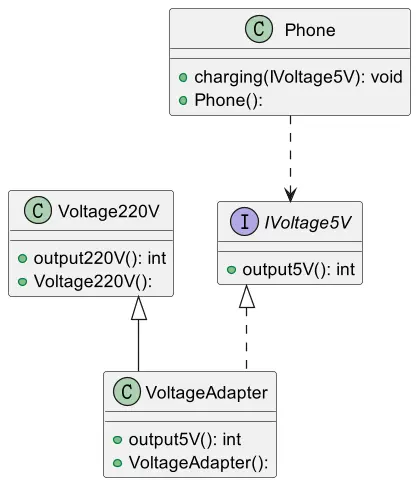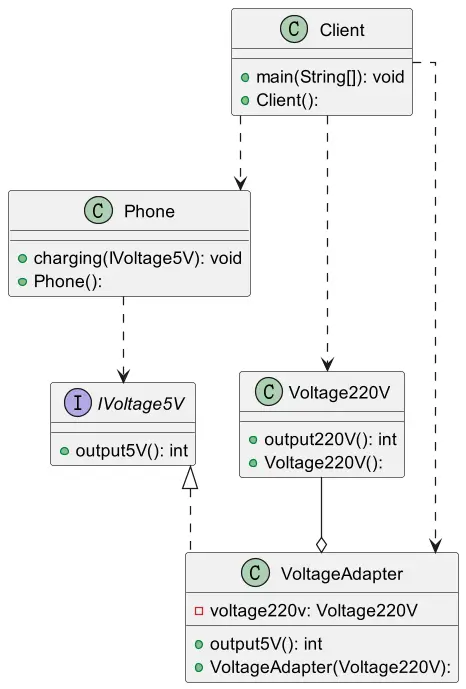 适配器模式
适配器模式
# 简介
适配器模式 (Adapter Pattern) 将某个类的接口转换成客户端期望的另一个接口表示,主的目的是兼容性,让原本因接口不匹配不能一起工作的两个类可以协同工作。其别名为包装器 (Wrapper)
适配器模式属于结构型模式
主要分为三类:类适配器模式、对象适配器模式、接口适配器模式
从用户的角度看不到被适配者,是解耦的,用户调用适配器转化出来的目标接口方法,适配器再调用被适配者的相关接口方法,用户收到反馈结果,感觉只是和目标接口交互。

# 类适配器模式
# 代码示例
/**
* 适配接口
*/
public interface IVoltage5V {
int output5V();
}
2
3
4
5
6
/**
* 被适配的类
*/
public class Voltage220V {
// 输出220V的电压
public int output220V() {
int src = 220;
System.out.println("电压=" + src + "伏");
return src;
}
}
2
3
4
5
6
7
8
9
10
11
package adapter.classadapter;
/**
* 适配器类
*/
public class VoltageAdapter extends Voltage220V implements IVoltage5V {
@Override
public int output5V() {
int src = output220V();
src = src / 44;
return src;
}
}
2
3
4
5
6
7
8
9
10
11
12
13
14
/**
* 手机
*/
public class Phone {
/**
* 充电
* @param iVoltage5V
*/
public void charging(IVoltage5V iVoltage5V) {
if (iVoltage5V.output5V() == 5) {
System.out.println("电压为5V, 可以充电~~");
} else if (iVoltage5V.output5V() > 5) {
System.out.println("电压大于5V, 不能充电~~");
}
}
}
2
3
4
5
6
7
8
9
10
11
12
13
14
15
16
# 说明
Java 是单继承机制,所以类适配器需要继承 src 类这一点算是一个缺点,因为这要求 dst 必须是接口,有一定局限性。
src 类的方法在 Adapter 中都会暴露出来,也增加了使用的成本。
由于其继承了 src 类,所以它可以根据需求重写 src 类的方法,使得 Adapter 的灵活性增强了。

# 对象适配器模式
基本思路和类的适配器模式相同,只是将 Adapter 类作修改,不是继承 src 类,而是持有 src 类的实例,以解决兼容性的问题。 即:持有 src 类,实现 dst 类接口,完成 src→dst 的适配。
根据 “合成复用原则”,在系统中尽量使用关联关系来替代继承关系。
对象适配器模式是适配器模式常用的一种。

# 代码实例
/**
* 适配器类
*/
@AllArgsConstructor //提供一个全参构造
public class VoltageAdapter implements IVoltage5V {
private Voltage220V voltage220v;
@Override
public int output5V() {
int dst = 0;
if (null != voltage220v) {
// 获取220v电压
int output220v = voltage220v.output220V();
System.out.println("使用对象适配器,进行适配~~");
dst = output220v / 44;
System.out.println("适配完成,输出的电压为=" + dst);
} else {
throw new RuntimeException("没有电源接入");
}
return dst;
}
}
2
3
4
5
6
7
8
9
10
11
12
13
14
15
16
17
18
19
20
21
22
/**
* 客户端
*/
public class Client {
public static void main(String[] args) {
System.out.println(" === 类适配器模式 ====");
Phone phone = new Phone();
Voltage220V voltage220v = new Voltage220V();
VoltageAdapter voltageAdapter = new VoltageAdapter(voltage220v);
phone.charging(voltageAdapter);
}
}
2
3
4
5
6
7
8
9
10
11
12
13
# 说明
对象适配器和类适配器其实算是同一种思想,只不过实现方式不同。 根据合成复用原则,使用组合替代继承, 所以它解决了类适配器必须继承 src 的局限性问题,也不再要求 dst 必须是接口
这种方式使用成本更低,更灵活。
# 接口适配器模式
一些书籍称为:适配器模式 (Default Adapter Pattern) 或缺省适配器模式。
当不需要全部实现接口提供的方法时,可先设计一个抽象类实现接口,并为该接口中每个方法提供一个默认实现(空方法),那么该抽象类的子类可有选择地覆盖父类的某些方法来实现需求。
适用于一个接口不想使用其所有的方法的情况。

# 代码实例
public interface Interface4 {
void m1();
void m2();
void m3();
void m4();
}
2
3
4
5
6
7
8
9
/**
* 在 AbsAdapter 我们将 Interface4 的方法进行默认实现
*/
public abstract class AbsAdapter implements Interface4 {
@Override
public void m1() {
}
@Override
public void m2() {
}
@Override
public void m3() {
}
@Override
public void m4() {
}
}
2
3
4
5
6
7
8
9
10
11
12
13
14
15
16
17
18
19
20
21
22
23
24
25
/**
* 客户端
*/
public class Client {
public static void main(String[] args) {
AbsAdapter adapter = new AbsAdapter() {
// 只想用到m1方法
@Override
public void m1() {
System.out.println("我重写了M1方法");
}
};
adapter.m1();
}
}
2
3
4
5
6
7
8
9
10
11
12
13
14
15
# SpringMVC 中的适配器模式使用
- Spring 定义了一个适配接口,使得每一种 Controller 有一种对应的适配器实现类。
- 适配器代替 Controller 执行相应的方法。
- 扩展 Controller 时,只需要增加一个适配器类就完成了 SpringMVC 的扩展了。
// DispatchServlet.doDispatch()
// 通过request中的请来映射Controller
mappedHandler = getHandler(processedRequest);
if (mappedHandler == null) {
noHandlerFound(processedRequest, response);
return;
}
// 通过遍历找到Controller对应的适配器
HandlerAdapter ha = getHandlerAdapter(mappedHandler.getHandler());
2
3
4
5
6
7
8
9
10
手写 SpringMVC 通过适配器设计模式获取到对应的 Controller 的源码
/**
* 定义一个Adapter接口
*/
public interface HandlerAdapter {
public boolean supports(Object handler);
public void handle(Object handler);
}
//多种适配器类
class SimpleHandlerAdapter implements HandlerAdapter {
public void handle(Object handler) {
((SimpleController) handler).doSimplerHandler();
}
public boolean supports(Object handler) {
return (handler instanceof SimpleController);
}
}
class HttpHandlerAdapter implements HandlerAdapter {
public void handle(Object handler) {
((HttpController) handler).doHttpHandler();
}
public boolean supports(Object handler) {
return (handler instanceof HttpController);
}
}
class AnnotationHandlerAdapter implements HandlerAdapter {
public void handle(Object handler) {
((AnnotationController) handler).doAnnotationHandler();
}
public boolean supports(Object handler) {
return (handler instanceof AnnotationController);
}
}
2
3
4
5
6
7
8
9
10
11
12
13
14
15
16
17
18
19
20
21
22
23
24
25
26
27
28
29
30
31
32
33
34
35
36
37
38
39
//多种Controller实现
public interface Controller {
}
class HttpController implements Controller {
public void doHttpHandler() {
System.out.println("http...");
}
}
class SimpleController implements Controller {
public void doSimplerHandler() {
System.out.println("simple...");
}
}
class AnnotationController implements Controller {
public void doAnnotationHandler() {
System.out.println("annotation...");
}
}
2
3
4
5
6
7
8
9
10
11
12
13
14
15
16
17
18
19
20
21
/**
* 用来模拟Springmvc中DispatchServlet的适配器模式,DispatchServlet中的核心代码为doDispatch,
* 如果以后有新增的Controller,只需要新增一个适配器即可,做到了和代码的解耦
*/
public class DispatchServlet {
public static List<HandlerAdapter> handlerAdapters = new ArrayList<HandlerAdapter>();
public DispatchServlet() {
handlerAdapters.add(new AnnotationHandlerAdapter());
handlerAdapters.add(new HttpHandlerAdapter());
handlerAdapters.add(new SimpleHandlerAdapter());
}
public void doDispatch() {
// 此处模拟SpringMVC从request取handler的对象,
// 适配器可以获取到希望的Controller
HttpController controller = new HttpController();
// AnnotationController controller = new AnnotationController();
// SimpleController controller = new SimpleController();
// 得到对应适配器
HandlerAdapter adapter = getHandler(controller);
// 通过适配器执行对应的controller对应方法
adapter.handle(controller);
}
public HandlerAdapter getHandler(Controller controller) {
// 遍历:根据得到的controller(handler), 返回对应适配器
for (HandlerAdapter adapter : handlerAdapters) {
if (adapter.supports(controller)) {
return adapter;
}
}
return null;
}
public static void main(String[] args) {
new DispatchServlet().doDispatch(); // http...
}
}
2
3
4
5
6
7
8
9
10
11
12
13
14
15
16
17
18
19
20
21
22
23
24
25
26
27
28
29
30
31
32
33
34
35
36
37
38
39
40
